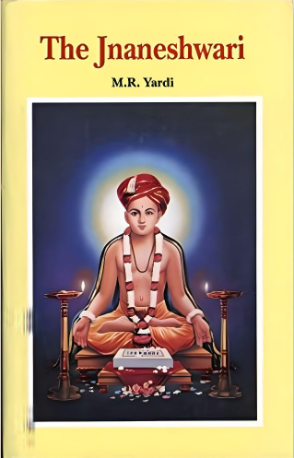ARTICLE Categories
RECENT POSTS
Jnaneshwari Click To Download...
Jnaneshwari is Bhagwad gita written by Shri Jnaneshwar, well known saint of Maharshtra in Marathi.
Explanations of Ego, Intellect, Mind, intelligence is given along with Desire and Happiness.
Ego:
It is mentioned that the gross elements are the Earth, the Water, the Fire, the Wind and the Sky. Just as one does not see a dream in the wakeful state, or the moon on the New Moon Day, the youth in a child, or fragrance in a bud, in short, O Arjuna, just as fire is hidden in firewood, so egoism is latent in the womb of prakriti. Just as the fever seated in the bones only waits for the faulty diet and then makes itself felt all over the body, so egoism makes the body dance as soon as the gross elements combine to form a body.
Intellect:
When the desire grows strong and the senses conquer their objects and offer the booty of pleasure and pain in the thing so presented. It distinguishes between pleasure and pain, merit and sin, the pure and the impure. Thus, a living being comes to know what is lofty and low, big and small and examines the sense-objects. So, that which is the source of knowledge and is the advanced state of sattva quality and which is on the borderline of the self and its embodied form, that, O Arjuna, is the intellect.
Mind:
The mind is an illusory thing like the bluish colour of the sky or the unreal wave of the mirage. When the body is formed from the gross elements, as a result of the union of semen and blood(ovum), then the vital air transforms itself into ten kinds. Then these ten kinds of vital air dwell in their respective parts of the body, according to their nature. The pure fickleness, which exists in these ten vital airs, becomes separate from them and gets support from the strength of the rajas quality. This fickleness plays a powerful part in between the intellect and egoism. It is at the junction of the sense organs and intellect and pushes the sense organs towards their sense- objects.
It is given the fictitious name of mind, but it is a mere notion, which is responsible for the embodiment of the Self, and is the cause of activity. It is that which gives rise to the notion of duality, promotes ignorance. It is that which promotes passion, incites the ego, increases desire, strengthens hope and reinforces fear.
It is that which creates the world of fancy and immediately razes it, as if forming castles in the air and then pulling them down. It is that which is the house of delusion and the inner essence of the vital air, which has locked up the intellect. It is this, which is called the mind.
Consciousness or Intelligence:
Now, O Arjuna, when the body is under the sway of the Self, which is the detached witness of everything, there results what is known as intelligence. It is ever awake, pervading the body from head to feet and remains unchanged in all the three states of wakefulness, dreaming and deep slumber. It keeps the mind, intellect etc. fresh and the wood in the form of prakriti in full bloom as in spring. It pervades without doubt all things, animate as well as inanimate, in more or less proportions. Just as the army under the command of a king, who does not know how big it is, defeats his enemy, or the sea gets its tidal wave with the appearance of the moon; or the iron moves in the proximity of the magnet; or the affairs of the world are carried on in sunlight; so the inner parts of the body are animated by the presence of the Self, dwelling in it. This is what is known as intelligence.
Desire:
Desire is that state of the mind, which results from the recollection of a past experience or a sound heard before or it is that state of mind, which arises speedily out of passionate craving when the sense organs and their objects meet. As a result of this, mind runs helter-skelter and tastes the forbidden fruit. That mental state which relishes the sensual pleasures and deludes the intellect, is known as desire.
Happiness:
The mental state, which arises when the senses have attained their sensuous enjoyments it brings to a stop all the activities of the body, speech and the mind; makes the body forget itself, paralyses the vital air, enforces the sattvika sentiments and gathers all the functions of the senses in the heart and coaxes them to sleep. In short, that mental state in which the embodied Self comes into contact with the self is called happiness.
Hatred:
When the senses are deprived of their sensuous enjoyments, is said to be hatred.
Pleasure and Misery:
Now pleasure is that mental state, which makes one forget other things. And to live without attaining this state is itself misery. Happiness is not attained when the mind is attached to desires, and in the absence of desire it is a natural and self-existent state.
So, pleasure and pain depend upon the absence and existence of desire.


